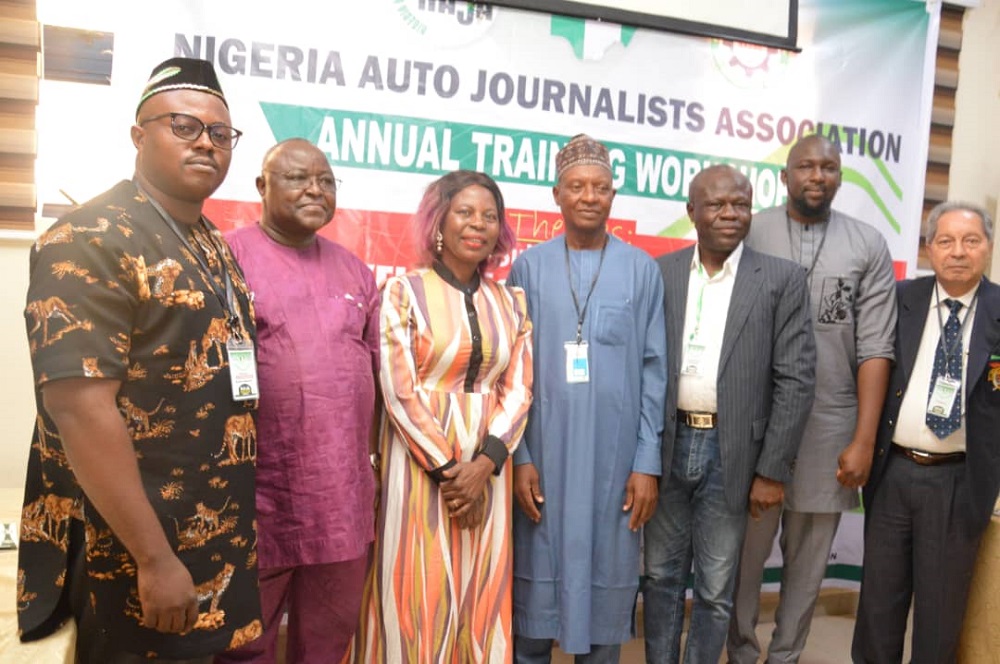Photo Caption
L-R: Mr Elijah Wisdom, CEO/Founder, Creek Transitway Ltd; Engr. Olufunso Amoo, Executive Chairman/Founder, Funtay; Deaconess Felicia Oyebolu, Deputy Director and HOD, Information and Public Relations Unit, National Automotive Design and Development (NADDC) representing the DG; Dr Mohammed Ibrahim, Chairman, National Gas Expansion Programme (NGEP); Mr. Mike Ochonma, Chairman, Nigeria Auto Journalists Association (NAJA); Engr. Yusuf Aweda, Senior Software Engineer, Automation & Artificial Intelligence and Mr. Rajinder Malhan, Director, Automotive, Platinum, during the 2023 NAJA Annual Training Workshop themed “Fuel Subsidy Removal: ‘Autogas/Electric Vehicles as Alternatives’ and “Role of New Media in Automotive Industry Reportage” held in Lagos on Friday
As the use of alternative fuel to Premium Motor Spirit (PMS), commonly known as petrol, as well as diesel, continue to dominate discussions in Nigeria, following the removal of subsidy on PMS. In this regard, a major voice in the industry, has stated that the drive for LPG usage as autogas will achieve faster results than CNG.
Chairman of the National Gas Expansion Programme (NGEP), Dr. Mohammed Ibrahim, in a paper presentation in Lagos last week, argued that with the current state of gas infrastructure in the country, LPG usage as Autogas, will achieve faster results than CNG.
According to him, LNG usage has better cost implication, even as the current state of gas infrastructure in the country, favours faster deployment of LNG. He also said LNG will give longer mileage as autogas.
Ibrahim who spoke at a training capacity building programme of Nigeria Auto Journalists Association (NAJA), added, “Globally, autogas as a fuel of choice for the mobility sector have risen over 40%. Autogas powers the largest number of vehicles running on alternative fuels. Car manufacturers are switching to direct injection engine that produces substantially lower emissions. In fact, 8 of the 10 largest car manufacturers produce LPG cars.
“An estimated 2.5 million vehicles in India run on LPG, or Autogas, which effectively makes it one of the top five Autogas markets in the world in terms of fleet size. The Energy Commission (EC) of Ghana in 2011 revealed that about 37% of LPG supply to Ghanaian market is consumed by vehicles while the remaining 63% is consumed by households and others. Another report by the EC of Ghana in 2015 revealed the increasing trend of LPG in the transport sector for commercial vehicles in the year 2000 and 2010.”
He revealed that 9,000 out of 10,000 registered filling stations in Nigeria are qualified to become multi-fuel stations where vehicle owners could refuel for autogas, in addition to petrol/diesel refuelling as well as serve as charging stations for electric vehicles.
He said “Under our NGEP programme, we have what we call the multi-fuel scheme whereby we do not intend to shut down the current petrol stations that we have in the country.
“We have carried out an audit whereby 9,000 of 10,000 of them qualify to retrofit to become multi-fuel stations,” he said.
He also said the country required over five million conversion kits, which would create about 12.5 million jobs.
Ibrahim said that there is N250 billion of NGEP fund domiciled in the Central Bank of Nigeria (CBN) for the purpose of importation of conversion kits and related products.
He however regretted that the apex bank management frustrated their attempt to access the fund.
In conclusion the NGEP Chairman said “The Precarious and daunting situation currently experienced in the downstream petroleum sector is a bitter reality that requires the urgent attention of all us present in this hall and the only alternative in the short, middle and long term is gas. Nigeria being richly endowed with abundant natural gas can leverage on this resource as a catalyst for economic growth and the transport sector is not an exception”












